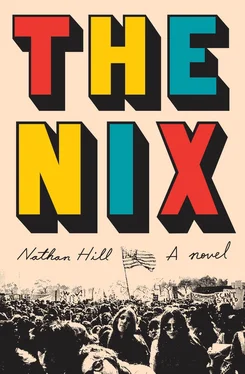Trying to find the perfect gift in the mall was like reading a Choose Your Own Adventure book when the choices were absent. He had to guess which page to turn to. The happy ending was out there somewhere, hidden.
Samuel walked by the candle store and breathed one or two lungfuls of its cinnamon odor. The nail salon gave him a momentary toxic headache. The candy store’s plastic bins of jawbreakers called to him, but he resisted. The mall’s music mixed with the music coming from each of the stores, the effect being like a car going into and out of radio coverage. Songs faded in, faded out. Earlier they were playing something happily Motown. Now they were playing “The Twist.” Chubby Checker. One of his mother’s least-favorite songs — a fact Samuel didn’t know how he knew. And he was considering the music and listening to the music coming out of the stores and he actually saw the music store across the food court before the idea finally struck, and he couldn’t believe it had taken him this long to come to it.
Music.
Bethany was a musician. He ran to the store and felt embarrassed that in all this time he’d been asking himself what he could give her without asking himself what she might actually want. And this felt egotistical and selfish and definitely something he’d have to work on personally some other time, when he didn’t have to find the perfect gift in like ten minutes.
So he ran into the store and was briefly disheartened when he saw that all the popular cassette tapes were around twelve dollars and thus outside his budget. But this despair did not last long because at the back of the store he spotted a bin labeled “Classical Music” and, below that, “Half Off,” which felt like providence. The cassettes here were six bucks and one of them — he was sure of it — was the perfect gift.
But as Samuel rifled through the clacking, disordered chaos of the clearance bin, he encountered a fundamental problem: He didn’t know any of this music. He didn’t know what Bethany would like, what she already owned. He didn’t even know what was good. Some of the names were familiar — Beethoven, Mozart — but most were not. Some were unpronounceably foreign. And he was about to go with one of the famous names he’d heard before — Stravinsky, though he couldn’t remember why he knew it — when he decided that if he’d heard of Stravinsky, then Bethany almost assuredly already owned every Stravinsky recording and was probably by now bored with them, and so he resolved to find something more modern, interesting, new, something that advertised his fascinating tastes and showed how he was different and independent and didn’t follow the herd like everyone else. So he picked out the ten most interesting-looking covers. Nothing with the portrait of the composer, nothing with an old painting or a photograph of a stuffy-looking orchestra, nothing with a conductor holding a baton. He went for the conceptual stuff: splashy colors, abstract geometric shapes, psychedelic spirals. He brought them to the counter and piled them in front of the cashier and asked, “Which of these would no one ever buy?”
The cashier, a sensitive-looking thirtysomething assistant-manager guy with a ponytail, did not act like this was an odd question but rather looked through the cassettes dutifully and then, with an air of authority that made Samuel trust him, picked one and shook it and said, “This one. No one ever buys this one.”
Samuel put down his ten dollars and the cashier wrapped the cassette in a bag.
“This is really modern stuff,” the cashier said. “Really out there.”
“Good,” Samuel said.
“It’s the same piece recorded ten different times. Like, really weird stuff. You like this?”
“Very much.”
“Okay,” he said. He gave him his change and Samuel still had about four bucks left. He ran to the candy store. The perfect gift swung wildly in its bag and battered the back of his legs and his mouth puckered in anticipation of the jawbreaker he was going to buy and his head bounced to the mall’s music and his eyes fluttered with daydreams where he made the right choice every time and all his adventures had the very best and happiest endings.
BISHOP FALL WAS A BULLY, but not an obvious bully. He did not prey on the weak. He left them alone, the skinny boys, the awkward girls. He wanted nothing easy. It was the strong and confident and self-possessed and powerful who drew his attention.
During the school year’s first pep rally, Bishop took an interest in Andy Berg, resident champion of all things brutal, only member of the sixth-grade class to achieve dark growths of leg and underarm hair, local terrorizer of the small and shrill. It was the gym teacher who first started calling him “Iceberg.” Or, sometimes, just “the Berg.” Because of his size (colossal), speed (slow), and the way he moved (unstoppably). The Berg was your typical grade-school bully: vastly bigger and stronger than anyone else in class, and transparently externalizing some raging inner demons about his stunted mental abilities, which were the only things stunted about him. The rest of his body was on some kind of genetic sprint to adulthood. He was now, in sixth grade, taller than the female teachers. Heavier, too. His body was not one of those destined for athletic greatness. He was simply going to be thick. A torso shaped like a beer keg. Arms like beef flanks.
The pep rally began as it usually did, with grades one through six sitting in the bleachers of the odd-smelling rubber-floored gymnasium, watching assistant principal Terry Fluster (who, by the way, was dressed as a six-foot-tall red-and-white eagle, the school’s mascot) lead them through a series of cheers, beginning, as always, with: Eagles! Don’t do drugs!
Then Principal Large shushed them and gave his typical inaugural spiel about his expectations for behavior and his zero-tolerance, no-shit-taking teaching philosophy, during which the students stopped paying attention and stared narcoleptically at their shoes, save for the first graders, who were hearing this for the first time and were, naturally, terrified.
The pep rally concluded with Mr. Fluster’s usual: Let’s go, Eagles! Let’s go, Eagles!
And the students yelled and clapped along with him at a level that was roughly one-quarter of the assistant principal’s enthusiasm, still loud enough to mask Andy Berg’s individual cheer, which was audible only to the several people standing around him, Samuel and Bishop included: Kim’s a faggot! Kim’s a faggot!
Directed of course at poor Kim Wigley, standing two paces to the Berg’s left, by all accounts the easiest boy to make fun of in the entire sixth-grade class, one of those kids suffering through every prepubescent disaster there was: thick snowy dandruff, aggressive braces, chronic impetigo, extreme nearsightedness, severe allergies to nuts and pollen, destabilizing ear infections, facial eczema, bimonthly pinkeye, warts, asthma, even an occurrence of head lice in the second grade that no one ever let him forget. Plus he was all of about forty pounds soaking wet. Plus he had a girl’s first name.
In these moments, Samuel knew the “right” thing to do would be to defend Kim and stop the bullying and stand up to the giant Andy Berg because bullies back down when they encounter resistance according to the brochures they were given in health class once a year. This was, everyone knew, a big fat lie. Because last year Brand Beaumonde actually did stand up to the Berg for the constant scorn directed toward Brand’s bulletproof-thick eyeglasses, stood up to him right in the middle of the lunchroom and said “Shut up your big mouth you big jerk!” in a spasm of nervous agitation. And the Berg did indeed back down and left him alone the rest of the school day and everyone who witnessed it was jubilant because maybe they were safe now and maybe the pamphlets were right and this great sense of optimism pervaded the school and Brand was a minor hero until the Berg found him on his way home that day and beat him up so savagely that the police actually got involved and interviewed Brand’s friends who, by now, had learned an important lesson: to keep their fucking mouths shut. Bullies do not back down.
Читать дальше












